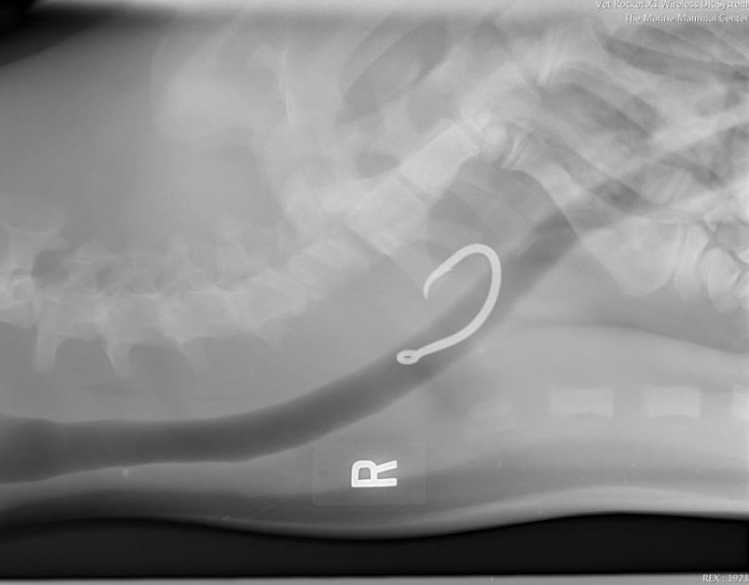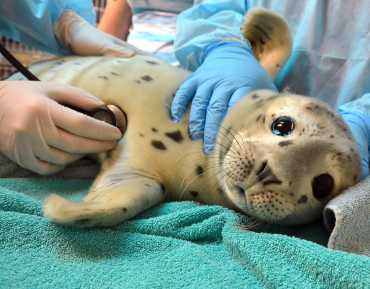
Portable X-Ray Machine Will Help Diagnose Hawaiian Monk Seals
- Species conservation
This St. Patrick’s Day will be a lucky one as staff from the Center and NOAA’s Monk Seal Research Program will be installing a new portable digital X-ray machine that will allow stranded monk seals to be quickly diagnosed in the wild.
Developed by Vet Rocket, this rugged, waterproof machine takes radiographs (or X-rays) wirelessly and then transmits them digitally to a computer screen, providing veterinarians on the beach with visual clues about an animal's health.
Vet Rocket consulted with The Marine Mammal Center’s director of Veterinary Science, Dr. Shawn Johnson, during development of the portable X1 system to determine the requirements necessary for use with marine mammals. For example, the machine has to be saltwater-proof and rugged enough for a sandy beach. It also has to be battery-powered, lightweight and readable in bright sunlight -- all while being strong enough to assess a large animal, such as a 450-lb. Hawaiian monk seal.
The machine being installed at The Marine Mammal Center’s new Hawaiian monk seal hospital, Ke Kai Ola, was donated by Falko Partners. It’s a huge gift not just financially but also for the future survival of the 1,100 Hawaiian monk seals alive today.
One of the threats facing Hawaiian monk seals is accidental ingestion of fishing hooks, a fatal mistake for a hungry seal. With the donated Vet Rocket X1, our animal care staff will be able to determine right there on the beach whether an ailing monk seal has ingested a hook and its location inside the animal's body.
If a fishing hook is found via X-ray, the seal can be rushed to The Marine Mammal Center’s Ke Kai Ola hospital for surgery.

Being able to take equipment directly to an ailing seal and make an informed decision on the beach is less stressful and much safer for the animal, Dr. Johnson says. The Vet Rocket machine provides immediate feedback and reduces the need for handling and transporting animals.
At the heart of the X1 machine is a military-grade, fully rugged computer tablet that functions as the master control for the entire system, says Andy Fu, President and CEO of Vet Rocket. The computer is built to withstand 1 inch of rain per hour, a drop from 3 feet above the ground, and high-impact shock and vibrations. These features are all crucial for usability in the field.
Earlier this year, Dr. Johnson tested a prototype of the Vet Rocket X1 on KE-18, an adult Hawaiian monk seal currently being housed at Long Marine Laboratory in Santa Cruz, California. The machine was able to detect hooks placed near the seal’s neck, upper body and abdomen.
Thanks to this breakthrough solution in on-beach diagnosis, the generosity of Falko Partners and a successful collaboration between The Marine Mammal Center and NOAA, critically endangered Hawaiian monk seals will have a better chance at survival.
Yes, I want to save a life!

Yes, I want to save a life!
You’ll be giving sick and injured animals the best possible care at the Center’s state-of-the-art hospital. With your gift today, you are giving a patient a second chance at life in the wild.
See Our Latest News
{"image":"\/Animals\/Wild\/Gray whale\/cropped-images\/two-gray-whales-golden-gate-bridge-shutterstock-0-0-1270-992-1770234810.jpg","alt":"two gray whales under the Golden Gate Bridge","title":"The Marine Mammal Center and San Francisco Harbor Safety Committee Pilot New Vessel Operator Training Program","link_url":"https:\/\/www.marinemammalcenter.org\/news\/the-marine-mammal-center-and-san-francisco-harbor-safety-committee-pilot-new-vessel-operator-training-program","label":"Press Release","date":"2026-02-06 01:00:00"}

The Marine Mammal Center and San Francisco Harbor Safety Committee Pilot New Vessel Operator Training Program
February 6, 2026
Read More{"image":"\/Animals\/Wild\/Bottlenose dolphin\/cropped-images\/dolphinphoto-by-adam-li-c-noaa-0-0-1270-992-1769539954.jpg","alt":"A bottlenose dolphin jumps out of the water.","title":"What\u2019s the Difference Between Dolphins and Porpoises? And Other Animal Trivia","link_url":"https:\/\/www.marinemammalcenter.org\/news\/whats-the-difference-between-dolphins-and-porpoises-and-other-animal-trivia","label":"News Update","date":"2026-01-26 23:00:00"}

What’s the Difference Between Dolphins and Porpoises? And Other Animal Trivia
January 26, 2026
Read More{"image":"\/Animals\/Patients\/Sea otters\/2025\/cropped-images\/so-mooring-release-2-laurie-miller-c-the-marine-mammal-center-USFWS-permit-MA101713-1-147-8-1270-992-1770307740.jpg","alt":"Sea otter - Mooring","title":"Rescue Stories: Southern Sea Otter Mooring Named the 2025 Patient of the Year","link_url":"https:\/\/www.marinemammalcenter.org\/news\/rescue-stories-vote-for-your-favorite-marine-mammal-patient-of-2025","label":"News Update","date":"2026-01-16 10:05:08"}

Rescue Stories: Southern Sea Otter Mooring Named the 2025 Patient of the Year
January 16, 2026
Read More{"image":"\/People\/Action\/Veterinary care\/cropped-images\/Harris_Green turtle_TMMC-0-0-1270-992-1767649941.jpg","alt":"Heather Harris","title":"Seattle Aquarium Awards Dr. Heather Harris With Prestigious Conservation Research Award","link_url":"https:\/\/www.marinemammalcenter.org\/news\/seattle-aquarium-awards-dr-heather-harris-with-prestigious-conservation-research-award","label":"In the News","date":"2026-01-05 04:48:00"}

Seattle Aquarium Awards Dr. Heather Harris With Prestigious Conservation Research Award
January 5, 2026
Read More